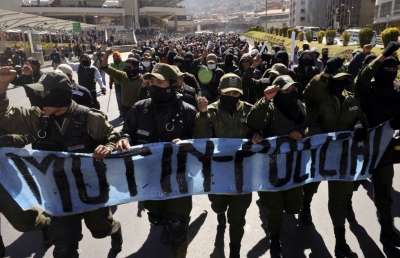Following recent expressions of concern at the international level about the situation in Bolivia, the BIF has produced the following briefing.
This last weekend brought to an end a period of tension within Bolivia, characterised by a six-day strike by the police and then, on the day that this was resolved, by the entry into La Paz of the IX Indigenous March, the second in successive years on the unresolved TIPNIS issue.
 Police on strike hold demonstrationThe police strike – widely described as a mutiny – ended on June 27. It concluded six days of sometimes violent marches by masked policemen, particularly the lower paid, not least in central La Paz. The final agreement met with most of the demands originally lodged. It involved a 22% rise in basic pay; a double food ration; the repeal of Law 101 (which governs disciplinary matters in the police) and its replacement with a new law; a promise to set up an independent ombudsman within the police to deal with abuse of authority; and the commitment not to punish those involved in the strike.
Police on strike hold demonstrationThe police strike – widely described as a mutiny – ended on June 27. It concluded six days of sometimes violent marches by masked policemen, particularly the lower paid, not least in central La Paz. The final agreement met with most of the demands originally lodged. It involved a 22% rise in basic pay; a double food ration; the repeal of Law 101 (which governs disciplinary matters in the police) and its replacement with a new law; a promise to set up an independent ombudsman within the police to deal with abuse of authority; and the commitment not to punish those involved in the strike.
The government alleged that the strike was part of a ‘golpista’ plan to overturn the Morales government. It seems probable (though no concrete evidence has so far been released) that opposition groups took advantage of the situation to create a sense of destabilisation. There is evidence of weapons being introduced into some police barracks. The police strike followed hard on the heels of the overthrow of President Lugo in neighbouring Paraguay.
From the start, the government made clear that it would not involve the armed forces in the maintenance of public order. In February 2003, troops fought street battles with rioting police, a conflict in which several were killed. The armed forces remain loyal to the government.
Social movements, particularly campesinos from the Altiplano and colonos from the tropics mobilised in defence of what they saw as a political challenge to the government. They staged a large rally in La Paz on 26 June.
During the six days of the police strike, there were no major incidents of public disorder, such as attacks on state buildings, looting of stores or robbing banks. Some banks worked behind closed doors during the first few days as a precaution.
The police strike follows a number of conflicts between specific sectors of the workforce and the government, including the strike by health workers in April-May over hours worked, a confrontation with the Central Obrera Boliviana (COB) in May over wage demands, and the takeover by informal miners (‘cooperativistas‘) of the Colquiri mine which ended in the nationalisation of the mine, part of the Glencore consortium and previously the property of ex-President Gonzalo Sánchez de Lozada.
The TIPNIS march
The organisers of the TIPNIS march postponed their arrival in La Paz in order to avoid being seen as accomplices of the police action. They had marched for two months from Trinidad in protest at government plans to hold a consultation on whether to persist with the road building project through this indigenous territory and national park.
The march arrived in La Paz on 27 June, only hours after the agreement had been reached with the police. The numbers marching were fewer than last year, as were the numbers who turned out to greet them. The opposition Movimiento Sin Miedo (MSM), which controls the municipality of La Paz, provided strong logistical support to the march as it entered the city.
The police managed to steer the march away from demonstrations of support for the government from the campesinos and colonos who were still in the city following their rally the previous evening. The police also made sure that the march did have access to the Plaza Murillo, the scene of scuffles with striking police only days before.
The organisers of the TIPNIS march demand to negotiate directly with President Morales. The government says that it will dialogue with the rank and file and local leaders of the TIPNIS (corregidores), but not with the leaders of the march, since they have a wider set of interests they want to discuss. The government has raised questions about the probity of some of the leaders.
The marchers say they will stay in La Paz until such time as the government agrees to cancel the planned consultation. The Constitutional Tribunal has ruled that the consultation should take place, but on the basis of procedures agreed with the local inhabitants. It remains unclear at this stage whether such an agreement can be reached.

